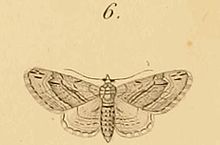Eupithecia phoeniceata
| Eupithecia phoeniceata | |
|---|---|

| |

| |
| Rambur's original illustration | |
| Scientific classification | |
| Domain: | Eukaryota |
| Kingdom: | Animalia |
| Phylum: | Arthropoda |
| Class: | Insecta |
| Order: | Lepidoptera |
| Family: | Geometridae |
| Genus: | Eupithecia |
| Species: | E. phoeniceata
|
| Binomial name | |
| Eupithecia phoeniceata | |
| Synonyms | |
| |
Eupithecia phoeniceata, the cypress pug, is a moth of the family Geometridae. The species was first described by Jules Pierre Rambur in 1834 and it can be found in Europe.
The wingspan is 18–22 mm. The ground colour of the forewings is grey or pale greyish ochreous conspicuously patterned with a characteristic extremely oblique pale median fascia, which makes the wing appear narrower than it really is. There are blackish-marked veins near the termen. Forewings with a small dark discal spot. The forewings are distinctly elongate. The hindwings have variable markings but usually resemble the forewings. The thorax is grey, with an anterior black collar.[2] [3]
The moths flies from August to September depending on the location.
The larvae feed on Cupressus macrocarpa and other cultivars.
References
- ^ Yu, Dicky Sick Ki. "Eupithecia phoeniceata (Rambur 1834)". Home of Ichneumonoidea. Taxapad. Archived from the original on 24 March 2016.
- ^ Eupithecia phoeniceata full description Watson, L., and Dallwitz, M.J. 2003 onwards. British Insects: The Genera of Lepidoptera-Geometridae. Version: 29 December 2011
- ^ Prout, L. B. (1912–16). Geometridae. In A. Seitz (ed.) The Macrolepidoptera of the World. The Palaearctic Geometridae, 4. 479 pp. Alfred Kernen, Stuttgart.pdf *
 This article incorporates text from this source, which is in the public domain.
This article incorporates text from this source, which is in the public domain.
External links
